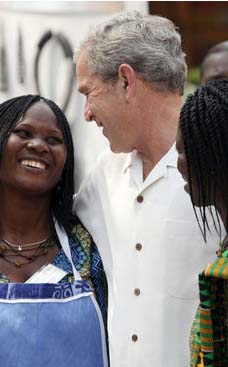
When rioting erupted, Sayers was away from her homebase on a Christmas camping holiday with friends. For this reason, she had only a backpack containing three changes of clothing when she was evacuated by a Peace Corps vehicle to a safe house in Kisumu on Jan. 2. Sayers remained at the safe house until Jan. 5, when she and 30 other Peace Corps volunteers were evacuated by charter jet to Tanzania. Sayers was unable to return to her home village to make her good-byes or collect her belongings before she was flown back to the United States.
Ditte Sayers’ quiet rural life as a U.S. Peace Corps volunteer in a village outside Kisumu, Kenya, ended abruptly when violence broke out in reaction to Kenya’s popular election Dec. 27
Keene to Kenya ... and back: Ditte Sayers reflects on her Peace Corps experience
By MARTHA ALLEN, News Correspondent
KEENE — Ditte Sayers’ quiet rural life as a U.S. Peace Corps volunteer in a village outside Kisumu, Kenya, ended abruptly when violence broke out in reaction to Kenya’s popular election Dec. 27. Her plan to stay on as a public health water and sanitation educator until August 2009 changed as civil unrest brought her stay to an untimely end and ultimately caused the Peace Corps to suspend its Kenyan program.
When rioting erupted, Sayers was away from her homebase on a Christmas camping holiday with friends. For this reason, she had only a backpack containing three changes of clothing when she was evacuated by a Peace Corps vehicle to a safe house in Kisumu on Jan. 2.
Sayers remained at the safe house until Jan. 5, when she and 30 other Peace Corps volunteers were evacuated by charter jet to Tanzania. Sayers was unable to return to her home village to make her good-byes or collect her belongings before she was flown back to the United States.
Jan. 21 found her at the airport in Albany, in T-shirt and flipflops, hugging her mother. Both were crying. Her parents, Dr. Peter and Anita Sayers of Keene, had brought along winter clothes.
Disappointed that she was unable to complete her teaching mission, still, Sayers realizes that her time in the Peace Corps was not wasted. Reflecting on her experience, she said that interactions with local people in her daily village life as well as e-mail communication with friends and family back home promoted understanding between peoples continents apart.
Living on the farm of her host family, who were better educated and wealthier than the norm, Sayers had her own small outbuilding to live in. She walked to town, did her own laundry and performed other tasks as others did in the village. She also worked her own garden.
“I loved gardening,” she said. “It kept me focused ... many Kenyans couldn’t believe that any white person could know how to dig in a garden, or would want to.”
Her “host mother” bragged to guests who came to call that Sayers had done the work all by herself.
She learned small talk at the dispensary where she worked, made friends at the post office, grew vegetables, shopped, cooked her own meals: chapatis, maize, beans, potatoes, tomatoes, spinach, cabbage and other vegetables and fruits.
“I was living in a dairy area — not desert, the way people might think of Kenya,” Ditte said.
A graduate of Keene Central School and McGill University in Canada, upon graduation from McGill University, on May 21, 2007, Ditte Sayers flew to Kenya as a U.S. Peace Corps volunteer. She had made a 27-month commitment to the organization.
Still, she had known that there might be cause for concern after the popular election. The two presidential candidates came from rival tribes. The winner, Mwai Kibaki, is a member of the Kikuya, the tribe that has dominated the political and business spheres since Kenyan independence from the United Kingdom in 1963. Opposition leader Raila Odinga is a member of the Luo tribe.
There are 48 tribes in Kenya, each with its own language, Sayers explained. In larger villages, Kiswahili, the national language, is spoken.
“Only people in their thirties and younger speak English,” she said.
How was she able to communicate with friends and family at home? By cell phone text messaging.
“I could get four bars of service in the bottom of a well or a desert in Kenya, and no service in Keene,” she said.
Sayers has the equivalent of an honorable discharge from the Peace Corps. Since Easter, she has been living in the Boston area, where she has a job with a consulting firm, working as an operations analyst on a project involving the Pennsylvania Department of Social Services.
“I can say without a doubt that my experience has made me more cynical, less idealistic, and yet, I also have so much hope for the Kenyan people. I’m much more aware now of the things I read in the news, of the ... impact that elections, political turmoil, have on the people on the ground,” Sayers reflects.
“Before, world news was abstract, but now, I can’t help but think of the mothers and their children trying to prepare dinner in the middle of civil wars in Darfur, or the men trying to bring in their cattle from pasture in the middle of government strafing in the Mount Elgon area of Kenya.
“My cynicism is toward governments. The people in Kenya came out in droves for that election, higher voter turnout than they’d ever had, and higher than most American elections. They voted because they believed that their vote mattered. And the candidates, both of them in my opinion, didn’t trust their voters, and did what they could to rig the election,” she said.
While allowing that she is now also cynical about the effectiveness of international aid organizations, she said she believes that the Peace Corps does play a valuable role in the world.
The Peace Corps is in the business of supplying trained personnel to parts of the world where it is needed; the other two thirds of the Peace Corps mission, Sayers explained, consists of sharing information about cultures.
In her words, “This exchange of ideas and beliefs, these conversations about the traditions and behaviors on both sides of the dialogue, is so important to international understanding, and to any advance by future Peace Corps.
“I only hope that my e-mails, and even this article, can help show people another side of ‘Africa’ that they never knew, couldn’t even imagine, and might bring them closer to the plight of the hundreds of millions of people who aren’t lucky enough to be born in the U.S.A.”
Note: Kenya has now made a coalition government, uniting the two rival candidates.








